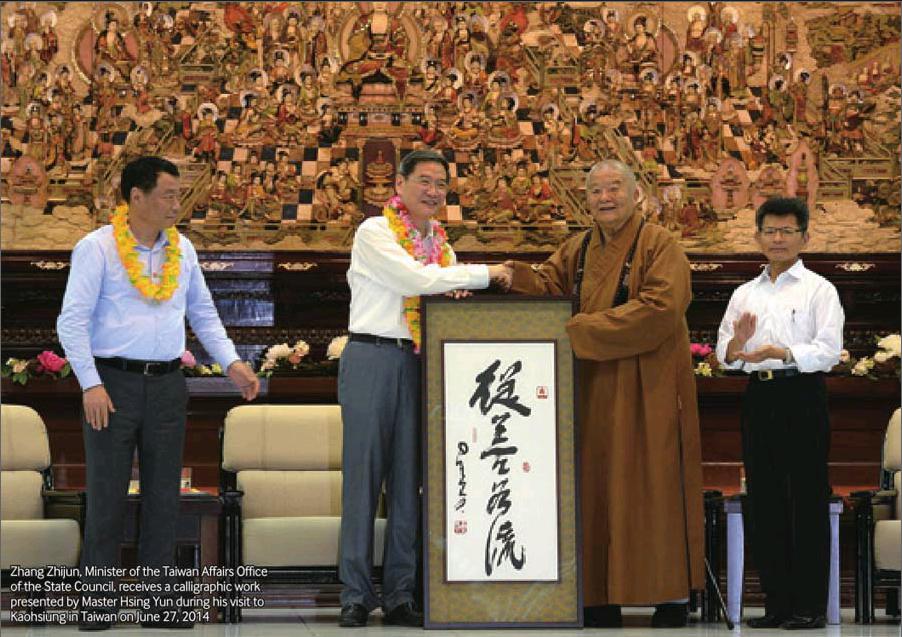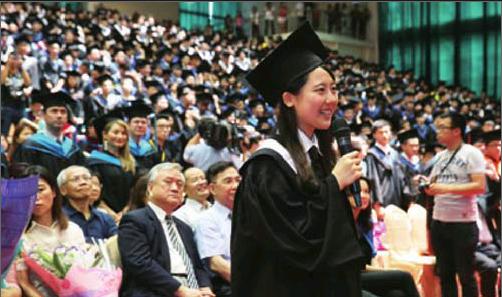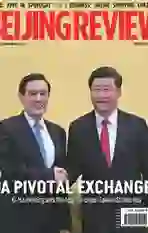POLITICAL BREAKTHROUGH
2015-12-09ByYuanYuan
By+Yuan+Yuan


Political communication between the Chinese mainland and Taiwan has never quite matched the frequencies of people-to-people interactions. The leaders of the two sides had not met since they separated in 1949 after a civil war.
That was finally changed in November when Xi Jinping and Ma Ying-jeou, in their role as “leaders of the two sides” of the Taiwan Straits, met in Singapore. Both Xi and Ma addressed each other as “mister” throughout their meeting.
The news of this historic meeting was released on November 4 and was greeted with surprise by people on both sides of the Straits, and garnered worldwide media interest.
More than 600 journalists from the Chinese mainland and Taiwan alone flew to Singapore to cover the momentous occasion.
“I talked with journalists from both the mainland and Taiwan, and we were all very excited to witness the historic moment,” said Yang Shengyu, Deputy Director of Taiwanbased news channel TVBS. “It was a big surprise, and we all agreed that this meeting has great significance for people in both the Chinese mainland and Taiwan.”
Fruitful meeting
When Xi and Ma appeared in the media spotlight at 3 p.m. on November 7, the camera flashlights caught every detail of the two “misters.” They were both dressed in dark suits. Xi sported a red tie, while Ma wore a blue one. The firm handshake between the two men lasted for about 80 seconds, and the gesture was splashed over the front pages of newspapers on both sides of the Straits.
“The handshake embodied both the past and the future of the two sides across the Straits, as well as the hopes of the rise of the Chinese nation,” Ma said.
“We are sitting together today to prevent historical tragedy from repeating itself, prevent the fruits from peaceful development of cross-Straits ties from being lost again, enable compatriots across the Straits to continue to create a peaceful life, and enable our next generations to share a bright future,” Xi said in his opening remarks.
He stressed that the two sides should prove with concrete moves that the Chinese from both sides have the capability and wisdom to solve their own problems.
Ma declared that the conflict and confrontation between the two sides no longer existed, calling on both sides to resolve their disputes through peaceful means.
“We should consolidate the 1992 Consensus and maintain the peaceful status quo,” Ma said in his five-point proposal. The 1992 Consensus mentioned by Ma is the acknowledgment that the Chinese mainland and Taiwan belong to one and the same China. It was reached in talks by the two sides across the Straits in 1992.
Ma also suggested that the heads of departments in charge of cross-Straits affairs should set up a hotline to deal with emer- gency issues.
Cheng You-ping, head of the Political and Economic Research Center at Taipei University, told Xinhua News Agency, “The leaders were comfortable with each other and did not act like strangers. It was very touching for a witness like me.”
After the speeches, Xi and Ma held a meeting behind closed doors at the Shangri-La Hotel.
The mainlands Taiwan affairs chief Zhang Zhijun described the Xi-Ma meeting as a milestone in the cross-Straits relationship when speaking to reporters at a press conference after the leaders concluded their talks. He said that the meeting will facilitate communication and dialogue between the mainland and Taiwan, as well as help to expand bilateral exchanges and deepen mutually beneficial cooperation.
According to Zhang, Xi outlined a fourpoint proposal on the cross-Straits ties during the closed-door session and described the adherence to the 1992 Consensus and opposition to “Taiwan independence” as the common political ground of both sides.
“Both sides belong to one country... That fact and legal basis has never changed and will never change,” Xi said.
Xi stressed that the mainland is willing to share its development opportunities with the people of Taiwan and suggested the two sides could improve macro-policy coordination and expand the space for economic cooperation.
Agreements on freight trade and other matters could come quickly, he added.
“Taiwans people are welcome to join the Belt and Road Initiative, and Taiwan is welcome to join the Asian Infrastructure Investment Bank in an appropriate manner,” Xi said.
The Belt and Road Initiative was proposed by Xi in 2013 to enhance regional economic and cultural exchanges through the building of the Silk Road Economic Belt and the 21stCentury Maritime Silk Road.
Zhu Weidong, a research fellow with the Institute of Taiwan Studies at the Chinese Academy of Social Sciences, said, “To have these leaders sit down together and meet is in itself a big deal. The meeting will set the tone for the future and certainly play a powerful role in future communication.”
Li Mingjiang, an associate professor at the S. Rajaratnam School of International Studies at Singapores Nanyang Technological University, noted that although the Chinese mainland and Taiwan had both referred to the 1992 Consensus on different occasions in the past, the fact that leaders across the Taiwan Straits made a clear mention of the term dur- ing the meeting gave it a whole new meaning.
We are family
During their meeting, both Xi and Ma called for greater efforts to promote the peaceful development of the cross-Straits relationship and expand bilateral exchanges.
Since 2008, the mainland and Taiwan have signed 23 agreements, and more than 40,000 students have taken advantage of academic exchange programs. More than 8 million tourists travel between the two sides each year. Annual trade is now worth more than $170 billion.
In his speech, Ma told Xi that he was impressed with seeing students from Taiwan and the mainland enjoying discussions, sports and music together on Taiwans campuses.
Yan Yijing, born in 1993, chose to go to Taiwan in 2011 to study at university after attending high school in Guangzhou, capital city of Guangdong Province. It was the first year that Taiwan universities officially allowed students from the mainland to enroll.
Yan was accepted by Fu Jen Catholic University. She was one of 975 students from the mainland who went to study in Taiwan that year. Even though Yans grades were good enough to gain admission to quite a few of the top colleges on the mainland, she didnt hesitate about her choice.
“I just wanted to experience something different and Fu Jen Catholic University is also a good university,” said Yan, who found the four years of study in Taiwan a pleasant experience.
“The food here is delicious and the people are friendly,” Yan said. “With more and more travelers coming to Taiwan from the mainland, many of my friends came and asked me to be their guide. It feels good.”
Hsieh Chinchung, a 20-year-old from Yunlin County in west Taiwan, decided to choose the opposite route. He went to study at Sun Yat-sen University in Guangzhou.
“My mother is from Tianjin, so Ive been visiting the mainland frequently since I was a youngster,” Hsieh said. “Members of my family began to settle in the mainland when I was in junior middle school.”
He regards himself as a local resident in Guangzhou. “I like the local cuisine and I can speak Cantonese,” he said. “I think its good to maintain the status quo between the mainland and Taiwan.”
Chang Yichen, 22, from Kaohsiung in Taiwan, is new to the mainland. He has just started his postgraduate study at Peking University in Beijing.
“Ive been in Beijing for two months and am still getting used to the food and the air,”Chang said. “I hope the separation issue is solved as soon as possible. Only a united country can stand out against global competition. There is no doubt that Taiwan and the mainland need each other.”
Taiwan businessman Vincent Hsu, who has businesses in the mainland and Hong Kong, watched the live TV broadcast of the leaders meeting and posted dozens of social media posts out of sheer excitement.
“Only by building up political mutual trust, will peace be sustained and avoid any back- tracking,” Hsu said.
David Gosset, a global affairs specialist and founder of the Euro-China Forum, said,“The leaders meeting signals to the world that the Chinese mainland and Taiwan are moving toward more coordination and convergence. As such, they are contributors to peace and prosperity in the region.”
“In this context, and at this stage, what really matters is the very fact that direct conversation takes place,” he continued. “The outcome is secondary.”
The EUs diplomatic service EEAS released a statement, saying the Xi-Ma meeting was an encouraging step, demonstrating the level of trust that has been built through the ongoing process of rapprochement.
Several opinion polls after the meeting in Taiwan showed supporters of the meeting outnumbered the critics.
The latest poll made by TVBS after the meeting, showed 55 percent of the 1,026 respondents considered the Xi-Ma meeting“conducive to cross-Straits peace and development,” 8 percentage points higher than before the meeting.
An online survey by Tw.yahoo.com showed one of the highest support rates with 68 percent of respondents in favor of the closer political ties.
“Supporters of the cross-Straits leadersmeeting far outnumbered the opponents,”said Chiu Yi, a board member of the Taiwan Institute of Economic Research. “The majority of Taiwanese residents have acknowledged the significance of the Xi-Ma meeting. Thats the mainstream public opinion in Taiwan.”
